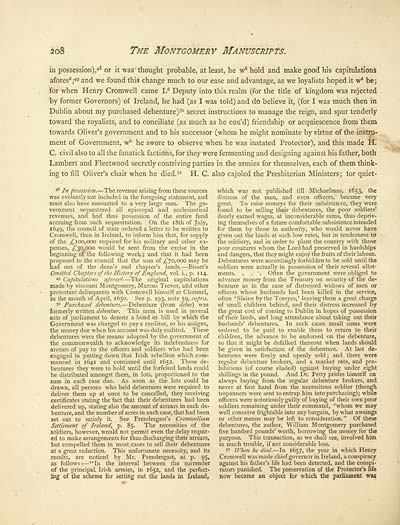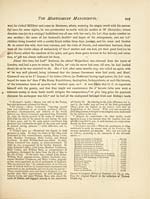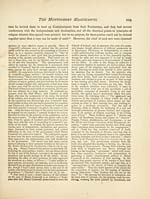Montgomery manuscripts
(222) Page 208
Download files
Complete book:
Individual page:
Thumbnail gallery: Grid view | List view

208
The Montgomery Manuscripts.
in possession)/ 8 or it was thought probable, at least, he w d hold and make good his capitulations
afores 4 ; 49 and we found this change much to our ease and advantage, as we loyalists hoped it w d be;
for when Henry Cromwell came L d Deputy into this realm (for the title of kingdom was rejected
by former Governors) of Ireland, he had (as I was told) and do believe it, (for I was much then in
Dublin about my purchased debenture) 50 secret instructions to manage the reign, and spur tenderly
toward the royalists, and to conciliate (as much as he cou'd) friendship or acquiescence from them
towards Oliver's government and to his successor (whom he might nominate by virtue of the instru-
ment of Government, w b he swore to observe when he was instated Protector), and this made H.
C. civil also to all the fanatick factions, for they were fermenting and designing against his father, both
Lambert and Fleetwood secretly contriving parties in the armies for themselves, each of them think-
ing to fill Oliver's chair when he died. 51 H. C. also cajoled the Presbiterian Ministers; for quiet-
43 In possession. — The revenue arising from these sources
was evidently not included in the foregoing statement, and
must also have amounted to a very large sum. The go-
vernment sequestered all episcopal and ecclesiastical
revenues, and had thus possession of the entire fund
accruing from such sequestration. On the 1 8th of July,
1649, the council of state ordered a letter to be written to
Cromwell, then in Ireland, to inform him that, for supply
of the ^100,000 required for his military and other ex-
penses, ^30,000 would be sent from the excise in the
beginning of the following week ; and that it had been
proposed to the council that the sum of ^70,000 may be
had out of the dean's and chapter's lands. — Bisset's
Omitted Chapters of the History of England, vol. i. , p. 114.
4 ' Capitulations aforesd — The original capitulations
made by viscount Montgomery, Marcus Trevor, and other
protestant delinquents with Cromwell himself at Clonmel,
in the month of April, 1650. See p. 193, note 59, supra.
s° Purchased debenture. —Debenture (from detect) was
formerly written debentur. This term is used in several
acts of parliament to denote a bond or bill by which the
Government was charged to pay a creditor, or his assigns,
the money due when his account was duly audited. These
debentures were the means adopted by the government of
the commonwealth to acknowledge its indebtedness for
arrears of pay to the officers and soldiers who had been
engaged in putting down that Irish rebellion which com-
menced in 1641 and continued until 1652. These de-
bentures they were to hold until the forfeited lands could
be distributed amongst them, in lots, proportioned to the
sum in each case due. As soon as the lots could be
drawn, all persons who held debentures were required to
deliver them up at once to be cancelled, they receiving
certificates stating the fact that their debentures had been
delivered up, stating also the amount of arrears in each de-
benture, and the number of acres in each case, that had been
set out to satisfy it. See Prendergast's Cronnuellian
Settlement of Ireland, p. 85. The necessities of the
soldiers, however, would not permit even the delay requir-
ed to make arrangements for thus discharging their arrears,
but compelled them in most cases to sell their debentures
at a great reduction. This unfortunate necessity, and its
results, are noticed by Mr. Prendergast, at p. 95,
as follows: — "In the interval between the surrender
of the principal Irish armies, in 1652, and the perfect-
ing of the scheme for setting out the lands in Ireland,
which was not published till Michaelmas, 1653, the
distress of the men, and even officers, became very
great. To raise moneys for their subsistence, they were
found to be selling their debentures, the poor soldiers'
dearly earned wages, at inconsiderable sums, thus depriv-
ing themselves of a future comfortable subsistence intended
for them by those in authority, who would never have
given out the lands at such low rates, but in tenderness to
the soldiery, and in order to plant the country with those
poor creatures whom the Lord had preserved in hardships
and dangers, that they might enjoy the fruits of their labour.
Debentures were accordingly forbidden to be sold until the
soldiers were actually in possession of their several allot-
ments. . . '. Often the government were obliged to
advance money from the Treasury on security of the de-
benture as in the case of distressed widows of men or
officers whose husbands had been killed in the service,
often 'Slaine by the Toreyes,' leaving them a great charge
of small children behind, and their distress increased by
the great cost of coming to Dublin in hopes of possession
of their lands, and long attendance about taking out their
husbands' debentures. In such cases small sums were
ordered to be paid to enable them to return to their
children, the advance to be endorsed on the debenture,
so that it might be defalked thereout when lands should
be given in satisfaction of the debenture. At last de-
bentures were freely and openly sold ; and there were
regular debenture brokers, and a market rate, and pro-
hibitions (of course eluded) against buying under eight
shillings in the pound. And Dr. Petty prides himself on
always buying from the regular debenture brokers, and
never at first hand from the necessitous soldier (though
trepanners were sent to entrap him into purchasing) ; while
officers were notoriously guilty of buying of their own poor
soldiers remaining under their command, 'whom we may
well conceive frightable into any bargain, by what aweings
or other means maybe left to consideration." Of these
debentures, the author, William Montgomery purchased
five hundred pounds' worth, borrowing the money for the
purpose. This transaction, as we shall see, involved him
in much trouble, if not considerable loss.
5' When he died. — In 1657, the year in which Henry
Cromwell was made chief governor in Ireland, a conspiracy
against his father's life had been detected, and the conspi-
rators punished. The preservation of the Protector's life
now became an object for which the parliament was
The Montgomery Manuscripts.
in possession)/ 8 or it was thought probable, at least, he w d hold and make good his capitulations
afores 4 ; 49 and we found this change much to our ease and advantage, as we loyalists hoped it w d be;
for when Henry Cromwell came L d Deputy into this realm (for the title of kingdom was rejected
by former Governors) of Ireland, he had (as I was told) and do believe it, (for I was much then in
Dublin about my purchased debenture) 50 secret instructions to manage the reign, and spur tenderly
toward the royalists, and to conciliate (as much as he cou'd) friendship or acquiescence from them
towards Oliver's government and to his successor (whom he might nominate by virtue of the instru-
ment of Government, w b he swore to observe when he was instated Protector), and this made H.
C. civil also to all the fanatick factions, for they were fermenting and designing against his father, both
Lambert and Fleetwood secretly contriving parties in the armies for themselves, each of them think-
ing to fill Oliver's chair when he died. 51 H. C. also cajoled the Presbiterian Ministers; for quiet-
43 In possession. — The revenue arising from these sources
was evidently not included in the foregoing statement, and
must also have amounted to a very large sum. The go-
vernment sequestered all episcopal and ecclesiastical
revenues, and had thus possession of the entire fund
accruing from such sequestration. On the 1 8th of July,
1649, the council of state ordered a letter to be written to
Cromwell, then in Ireland, to inform him that, for supply
of the ^100,000 required for his military and other ex-
penses, ^30,000 would be sent from the excise in the
beginning of the following week ; and that it had been
proposed to the council that the sum of ^70,000 may be
had out of the dean's and chapter's lands. — Bisset's
Omitted Chapters of the History of England, vol. i. , p. 114.
4 ' Capitulations aforesd — The original capitulations
made by viscount Montgomery, Marcus Trevor, and other
protestant delinquents with Cromwell himself at Clonmel,
in the month of April, 1650. See p. 193, note 59, supra.
s° Purchased debenture. —Debenture (from detect) was
formerly written debentur. This term is used in several
acts of parliament to denote a bond or bill by which the
Government was charged to pay a creditor, or his assigns,
the money due when his account was duly audited. These
debentures were the means adopted by the government of
the commonwealth to acknowledge its indebtedness for
arrears of pay to the officers and soldiers who had been
engaged in putting down that Irish rebellion which com-
menced in 1641 and continued until 1652. These de-
bentures they were to hold until the forfeited lands could
be distributed amongst them, in lots, proportioned to the
sum in each case due. As soon as the lots could be
drawn, all persons who held debentures were required to
deliver them up at once to be cancelled, they receiving
certificates stating the fact that their debentures had been
delivered up, stating also the amount of arrears in each de-
benture, and the number of acres in each case, that had been
set out to satisfy it. See Prendergast's Cronnuellian
Settlement of Ireland, p. 85. The necessities of the
soldiers, however, would not permit even the delay requir-
ed to make arrangements for thus discharging their arrears,
but compelled them in most cases to sell their debentures
at a great reduction. This unfortunate necessity, and its
results, are noticed by Mr. Prendergast, at p. 95,
as follows: — "In the interval between the surrender
of the principal Irish armies, in 1652, and the perfect-
ing of the scheme for setting out the lands in Ireland,
which was not published till Michaelmas, 1653, the
distress of the men, and even officers, became very
great. To raise moneys for their subsistence, they were
found to be selling their debentures, the poor soldiers'
dearly earned wages, at inconsiderable sums, thus depriv-
ing themselves of a future comfortable subsistence intended
for them by those in authority, who would never have
given out the lands at such low rates, but in tenderness to
the soldiery, and in order to plant the country with those
poor creatures whom the Lord had preserved in hardships
and dangers, that they might enjoy the fruits of their labour.
Debentures were accordingly forbidden to be sold until the
soldiers were actually in possession of their several allot-
ments. . . '. Often the government were obliged to
advance money from the Treasury on security of the de-
benture as in the case of distressed widows of men or
officers whose husbands had been killed in the service,
often 'Slaine by the Toreyes,' leaving them a great charge
of small children behind, and their distress increased by
the great cost of coming to Dublin in hopes of possession
of their lands, and long attendance about taking out their
husbands' debentures. In such cases small sums were
ordered to be paid to enable them to return to their
children, the advance to be endorsed on the debenture,
so that it might be defalked thereout when lands should
be given in satisfaction of the debenture. At last de-
bentures were freely and openly sold ; and there were
regular debenture brokers, and a market rate, and pro-
hibitions (of course eluded) against buying under eight
shillings in the pound. And Dr. Petty prides himself on
always buying from the regular debenture brokers, and
never at first hand from the necessitous soldier (though
trepanners were sent to entrap him into purchasing) ; while
officers were notoriously guilty of buying of their own poor
soldiers remaining under their command, 'whom we may
well conceive frightable into any bargain, by what aweings
or other means maybe left to consideration." Of these
debentures, the author, William Montgomery purchased
five hundred pounds' worth, borrowing the money for the
purpose. This transaction, as we shall see, involved him
in much trouble, if not considerable loss.
5' When he died. — In 1657, the year in which Henry
Cromwell was made chief governor in Ireland, a conspiracy
against his father's life had been detected, and the conspi-
rators punished. The preservation of the Protector's life
now became an object for which the parliament was
Set display mode to:
![]() Universal Viewer |
Universal Viewer | ![]() Mirador |
Large image | Transcription
Mirador |
Large image | Transcription
Images and transcriptions on this page, including medium image downloads, may be used under the Creative Commons Attribution 4.0 International Licence unless otherwise stated. ![]()
| Histories of Scottish families > Montgomery manuscripts > (222) Page 208 |
|---|
| Permanent URL | https://digital.nls.uk/95235591 |
|---|
| Description | A selection of almost 400 printed items relating to the history of Scottish families, mostly dating from the 19th and early 20th centuries. Includes memoirs, genealogies and clan histories, with a few produced by emigrant families. The earliest family history goes back to AD 916. |
|---|

